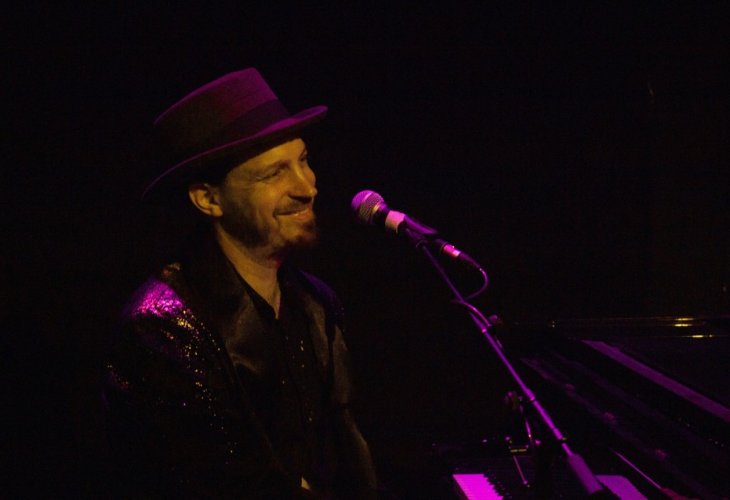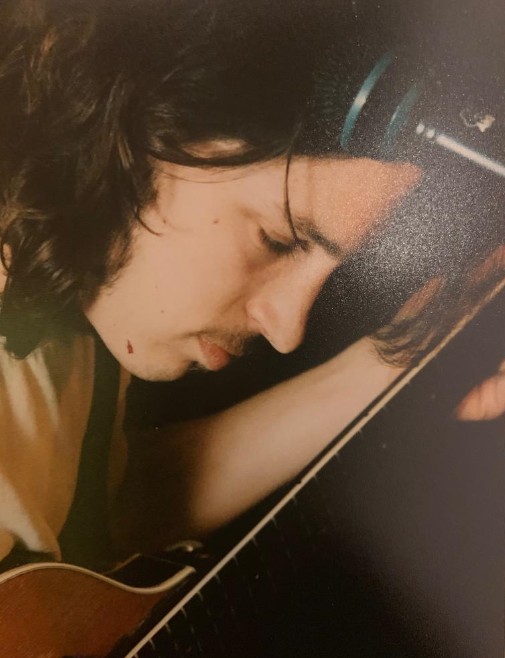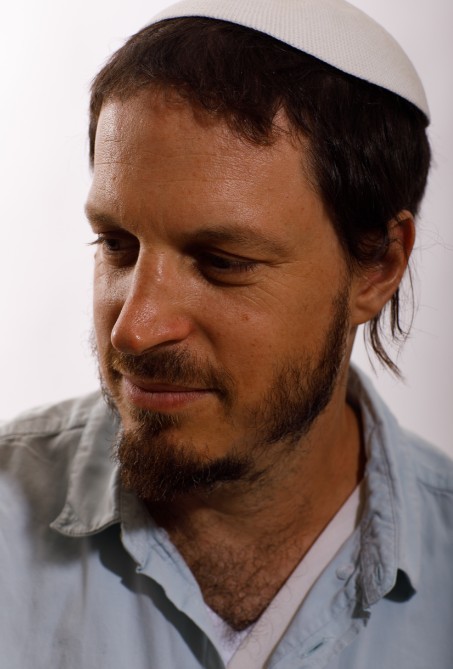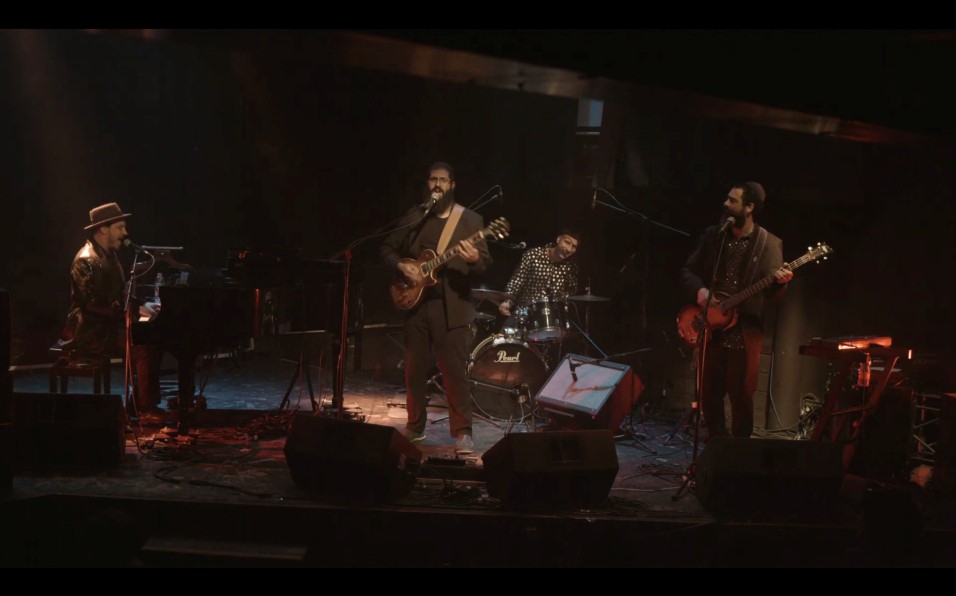Gadi Feingold: "I Told Hashem 'I Will Wholeheartedly Accept Whatever You Decide, Even If I Won't Have Children'"
With a new show and an intriguing third album, Gadi Feingold opens up in this exclusive interview about his childhood in the USA, adjusting to life in Israel, spiritual journey, surprising connection with Shaanan Streett, long wait for a child, and the sentence that changed his life.
 Gadi Feingold. Photo: Yarin Ackerman
Gadi Feingold. Photo: Yarin Ackerman"Late at night, a few years ago, I hitched a ride home with Rabbi Erez Moshe Doron," says Gadi Feingold, 44, married and father of three, residing in Ramat Gan, singer-songwriter, music producer, and owner of 'Pluto Studios.' "We were chatting, and during the conversation, the rabbi asked me about my music. I was 32 at the time, mainly playing at weddings and helping others produce their music, but I wasn't really focusing on my own creations at all.
I gave it some thought, and then told him that I want it to be a part of my life but right now it isn't present. I mentioned attending a Torah class by Ehud Banai, and he had shared that he released his first album only at the age of 35, so maybe I still had a few years to get there. The rabbi listened and then said, 'Gadi, know this - those who give up on their dreams, their dreams give up on them.' That sentence struck me. It's with me till today. There are sentences that change people's lives, and for me, this is one of them. The change wasn't immediate, I continued to 'sleep' on it for a few more years, but today I'm completely immersed in my own creations, and I owe much to Rabbi Erez because of it."
Telling Positive Forces: "You Are the Yetzer Hara"
Gadi Feingold was born in Israel, but when he was a year and a half old, his family moved to Silicon Valley, San Francisco. "My father had to travel there for work," he explains, "and truth be told, he was one of the first Israelis working in high-tech. He didn't intend to stay so long, but his success led to that outcome. Baruch Hashem, we returned a little before my bar mitzvah, and it was a great siyata dishmaya, because had I stayed there a few more years, I might have been a completely different person."
"Our parents always spoke to us in Hebrew, so when I arrived in Israel I didn't have any specific language barriers. In San Francisco, I attended a Jewish school, so content-wise it was acceptable. Today, by the way, I realize how important it was to study in a Jewish school – it greatly preserved our Jewish and Israeli identity. At home, we lived as a completely secular family, but at school, I studied Chumash and some Midrashim. I can totally say that my connection to the Torah, which was born there in America, helped me later when I returned to religion. However, it wasn't always easy, as it was a bit like a double message - at home, we hardly observed anything, but at school, I wore a tallit and yarmulke."
 Gadi Feingold
Gadi FeingoldThat sounds like a confusing situation, especially for a young child.
"Yes, it wasn't simple, but it's relatively common there. There are many Jewish families abroad who don't observe the commandments but want to maintain the connection, the bond. In the U.S., there's not as much anti-religious sentiment like, unfortunately, some secular people in Israel have. The world there is more divided between Jews and non-Jews. Our close environment consisted of Jews, and those who weren't Jewish generally belonged to more distant circles. In sixth grade, things changed because my parents transferred me to a public school where most weren't Jewish."
"It's not pleasant to say, but until we moved to Israel, I didn't really know my extended family," says Feingold. "We only came to Israel during vacations, so the introduction was limited. Additionally, when we arrived, I struggled with adaptation issues. I had a sort of cultural shock, and I also felt somewhat like an outsider. I liked things most others didn't, and vice versa. For example, everyone loved soccer and Bourekas films, but I wasn't interested. Today, by the way, I understand that this period helped me in my return to religion – I developed the ability to be different from the society I lived in. For instance, everyone goes on trips on Shabbat, and I don't. Also, music helped me in acclimatizing to Israel."
 Photo: Ben Pelehov
Photo: Ben PelehovHow did music help in that regard?
"We lived in Savyon, I studied in Yehud, and when I was 16, I formed my first band. Through engaging in music, I met friends, I was involved in positive things, and I learned new things. Music creation has always been a significant part of my life. Rabbi Nachman, in the introduction to Tales of Ancient Times, writes that the story 'The Lost Princess,' on which my show is based, applies to everyone at some point. I once asked myself where this story appears in my life and what the lost princess symbolizes for me, and I realized that for me, the lost princess is the music."
"An artist is always searching for something that is forever elusive," adds Feingold. "You write a song and record it, and you immediately think about how you can do it better in the future, seek inspiration from a higher place. In the original story, the king says to her: 'Let the non-good seize you," and she gets offended. In my childhood, I had a pure love for music, but then something went wrong there. When you start comparing yourself to others, wanting validation, wanting people to say you are talented, it’s no longer about the music itself. It's more like a shell that has been added to it."
I sense perhaps that your return to religion is also related to this.
"Yes, it is indeed connected. Thanks to the spiritual journey, I found my lost possession. I approached music from a more correct place. I probably needed to distance myself from it for a period to truly connect with myself, then return to it from a rectified place. However, during the process of returning to religion, there are sometimes dangerous moments. For example, as a returnee, you elevate yourself by disconnecting from negative forces, then you feel that in some sense you've lost strength, and that’s frightening. It requires very delicate work to know how to restore life's forces to their proper place."
As returnees, we often silence our life forces. We tell them: 'You are the yetzer hara, the animalistic soul, the imaginative power. I must not listen to you. But until we learn to connect all parts and forces within us, including even the lowest, our repentance will not be complete."
Waiting as Long as Necessary
Day by day, Gadi Feingold's main occupation is as the owner and manager of 'Pluto Studios,' which, according to industry leaders, is Israel's largest and most successful music studio. "What Pluto represents for me, and what I hope it will continue to represent," says Feingold, "is a meeting place. More or less known artists, more or less observant, meet, help each other, and create good things together."
"Many songs and albums were born in this studio, and surprising collaborations were formed there. In addition, hundreds of students have already learned in our sound and production school, and with Hashem's help, this will continue. I hope that the people who studied here go out into the world and spread goodness, and if we have a share in this – happy we are. In some sense, the students who have passed through here are our offspring, and it is very emotional."

Although students can be considered offspring in a certain sense, the issue of biological children was not simple for the Feingold couple. "It's amazing how eight years after our lack was filled, I hardly recall how much it burned in me," he shares. "And yet, I definitely remember it was a great trial for me. We waited seven years for our first child. Of course, there are people who have undergone greater trials, but in my situation, it was a significant test of faith. I remember one time isolating myself in prayer, saying to Hashem: 'I promise to wholeheartedly accept what you decide and not to anger if you decide we won't have children. On the other hand, if that’s your will, I promise not to stop wanting it all my life."
"It’s truly a paradox, this thing. On one hand, not to stop wanting, on the other, to accept wholeheartedly any decision of Hashem. By the way, years later I saw that I went through a similar experience with my music. On one hand, to keep wanting even when nothing happens or when good things happen, but the world doesn’t respond as I expected, and on the other hand, not to be angry and frustrated if it doesn't happen, but to accept Hashem's will with love. It's not wisdom to say that you accept Hashem’s will when in your heart you simply stopped wanting. And on the other hand, it's not wisdom to be angry at Hashem and the whole world if what you wanted didn’t happen. The wisdom is to live in this tension, to be in both places, and to wait as long as needed until Hashem opens the gates you so deeply want him to open."
In conclusion, I can't resist asking Feingold about the single he recently released, in which he collaborates with Shaanan Streett, a completely unexpected partner in the Jewish music genre.
"It is indeed surprising in some sense," he agrees, "but it turned out to be a wonderful connection. I'm currently working on an album that will essentially include the songs from the musical I'm performing 'The Lost Princess.' The album features several artists including Shuli Rand and Rami Kleinstein, but Shaanan was the last artist I approached among all the artists participating in the album. There was a phrase I wanted as the chorus of one of the album's songs that goes: 'So much time not feeling anything.' This phrase expresses the character in Rabbi Nachman's story who tries to long but cannot."
"I've been working on this album for seven years," says Feingold. "A few years ago, Hanan Ben Ari was at my house, we are musically connected, I played him this line, then continued playing him my other songs. A few minutes later, he asked me to play it again, and then he started doing beatboxing, which is somewhat like rap, and we saw it worked. I was looking for a rapper to do this song with me, and someone recommended Shaanan. I wrote him an email, told him what it's about – Rabbi Nachman, etc., and within twenty minutes, he got back to me and said he was in."
"Before we met, I had already prepared everything the song needed, and only the rap lyrics were left to do. I asked if he wanted to write the lyrics, and he said it would be better if we wrote them together, so I told him there's a monologue I do during this line in performances. I wrote him the monologue, he said: 'Give me a moment,' and wrote the rap lyrics, right then and there. He based them on my words but arranged and changed what was needed so that it fit the rap he does, with one of the important aspects being that everything had to rhyme. I've participated in creating many songs, but this was the fastest creation I’ve ever seen."

